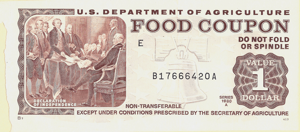By Brian Werner
 Notions of money, debt and morality have a long history together (see Graeber and Atwood). Money and the desire for it is usually connected with greed and immorality like in the often paraphrased “The love of money is the root of all evil” from the New Testament book 1 Timothy. But what if a better understanding of what money is can help our country to be moral?
Notions of money, debt and morality have a long history together (see Graeber and Atwood). Money and the desire for it is usually connected with greed and immorality like in the often paraphrased “The love of money is the root of all evil” from the New Testament book 1 Timothy. But what if a better understanding of what money is can help our country to be moral?
Currently money, or a perceived lack of money, is being used to justify all sorts of cuts in government spending, most recently an effort by the House of Representatives to cut SNAP (also known as food stamps) by $39 billion over the next ten years, a move that would cut off 3.8 million people in 2014, many of whom are children, seniors, unemployed, and low-wage workers, from already paltry benefits.
This should be seen as a moral decision not to provide food for those that need it. If I have more than enough food but refuse to share it with my starving neighbor, I think most people would consider that immoral. If as a country we can produce plenty of food, but we deny people access to it, is the morality any different?
Let’s think about how people get food in our society? Most people don’t grow all of their own food so they either 1) work for money to buy food 2) are given money to buy food 3) are given food directly by family, friends, charities, etc. How about #1? There are over 21.5 million who can’t find full-time employment. So, there are lots of people who just can’t find a job right now and there’s no indication that’s going to change any time soon. The government has refused to undertake spending increases or tax cuts to help the situation (and sequester cuts have moved things in the wrong direction). How about #3? While family and friends are important, with the sheer number of unemployed people, it’s unlikely that a community response will be enough. Food pantries are already stressed with shortages. This brings us back to #2, giving people money to buy food, which is what the SNAP program does (though instead of cash it uses EBT cards than can only be used for food). And it makes a lot of sense. We already have lots of grocery stores that want to sell food (and are good at it). We have people who need food. All we’re missing is the money to make it happen; that’s where the government comes in.
Conservatives and liberals alike tend to agree that the government doesn’t have enough money. So conservatives use this as an excuse to cut programs they just don’t like. Liberals say we can increase taxes on the rich, spend less money on the military, and then spend more on social programs. Both viewpoints encourage us to justify moral decisions in terms of the government’s balance sheet. Both viewpoints are wrong.
What they’re wrong about is the idea that the federal government doesn’t have enough money, that the U.S. government can run out of U.S. dollars. This should immediately seem like an odd notion, but it’s been repeated so many times it’s usually taken on face value. Where does the U.S. dollar come from? Obviously the U.S. government. So how can it run out? It can’t. The U.S. dollar is a public monopoly. The federal government can always “afford” to spend by creating dollars and it doesn’t need to tax U.S. dollars from the private sector to do it. The same is not true for state and local governments which are users, rather than issuers of U.S. dollars.
The realization that the U.S. government is not constrained by a lack of dollars frees us to see moral nature of these policy questions. We have farmers and grocers that produce plenty of food and want to sell it. We have millions of people who don’t have money for food and can’t find a job to earn it. We have a sovereign government that controls and can create (or limit) the money necessary to bridge that gap. To deny people the fundamental right of food, by failing to provide either jobs or income, is clearly immoral.
The real limits we face are our environment, our citizens, and our ability to utilize them in a productive way. And people are more productive when they’re decently fed.












20 responses to “Money and Morality”